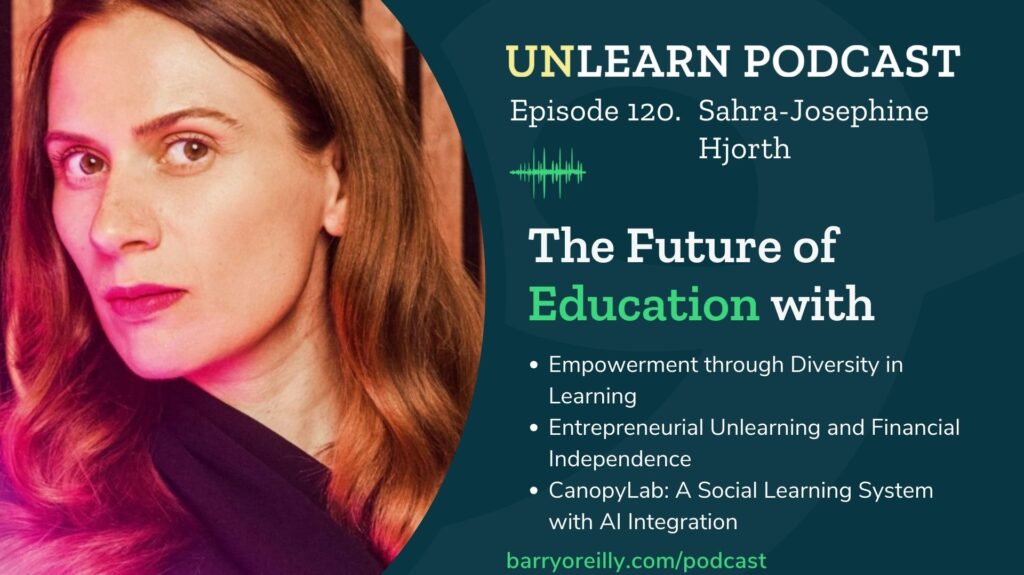Sahra-Josephine Hjorth, co-founder and CEO of CanopyLab, joins Barry O’Reilly on this episode of the Unlearn Podcast to explore the interconnectedness of different skills, fields and interests. Sahra’s career has spanned diplomacy, startups, creating social learning experiences and inventing the first AI course authoring tool, and she has been recognized for her innovative contributions to education, including being selected for Barack Obama’s Leaders in Europe program in 2022. Sahra and Barry talk about redefining success, the intersection of technology and education, the importance of adaptability in both personal growth and business development, and what kind of environments we create for students – and for entrepreneurs.
The Evolution of Learning Experiences
Sahra-Josephine’s work revolves around the concept of ’empowerment through diversity’ – the belief that embracing varied talents and perspectives leads to greater collective success. This insight first dawned on her in 2009, when she returned to Denmark and began volunteering for the United World College. Tasked with selecting scholarship students, Sahra’s role extended beyond academic assessment to fostering resilience and multifaceted growth. Her approach challenged conventional wisdom, and that while “we really want to put humans in a box,”- we can’t and should be designing systems that don’t try to. [Listen from 01:55]

Entrepreneurial Unlearning and Financial Independence
“Money is not important for the sake of money, but the freedom it gives you.” Sahra-Josephine states, emphasizing the empowerment that comes from financial independence and self-direction. This can be a challenge when you discover that you don’t like or can’t use elements of the path you started on. Sahra-Josephine experienced this when she decided that a life of diplomacy was not for her and that while learning a language is always valuable, mediocre Russian is not exactly useful. These shifts, however much they felt like failure, opened doors to a unique intersection of artificial intelligence, education, and human rights policy. Experiences that seem very disparate can actually be highly interconnected, and skills honed in one area can become invaluable in another, unexpectedly shaping a niche where few others have ventured. [Listen from 11:00]
The Birth and Growth of CanopyLab
Barry points out that CanopyLab is “a fascinating juncture of technology and education and learning, and also meeting people where they’re at, rather than trying to categorize them for the sake of simplicity” and asks Sahra-Josephine what she has had to learn and unlearn while growing the company. She shares that she isn’t sentimental about her business and that as she started to become a creator and work directly with the type of students she wanted to serve, she realized “we have to become a software company.” All of the current research about learning indicates it’s done best socially, so building a learning system that worked like a social media one meant that the users could integrate it on all of their platforms. As AI technology becomes more sophisticated, adding a high level of personalization has become possible. It all comes down to analyzing user data, feedback and trends. [Listen from 17:50]
The Problem with Entrepreneurial Culture
In the shift from conventional methods to an AI-driven approach, Sahra-Josephine says, “it’s about altering the paradigm of who is an educator and how learning is delivered.” We have a lot of preconceived ideas about who should teach and how, but the right teacher isn’t necessarily the one doing the Ph.D. You can also see this in the norms and socialization of entrepreneurs. Sahra-Josephine encourages business owners to think about whether they are doing things like giving speeches and coming to work when they’re sick or tired because it’s best for the company or just because it’s how things are done. These aren’t easy patterns to break, and she recounts how she set the precedent of working while sick at CanopyLabs. You have to be intentional about the norms you are participating in and creating at your company. [Listen from 24:40]
Future of Learning and AI Integration
As Sahra-Josephine Hjorth looks to the future, she is particularly focused on the challenge of figuring out ways to include people with a limited written language, highlighting the importance of inclusivity in the development of AI models. Her vision for the future of learning is one where technology not only enhances the educational experience but also ensures that no one is left behind. [Listen from 33:50]















